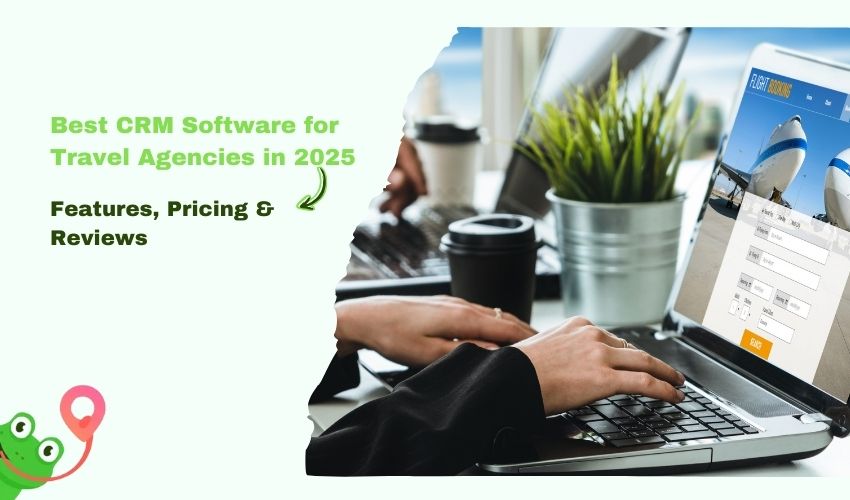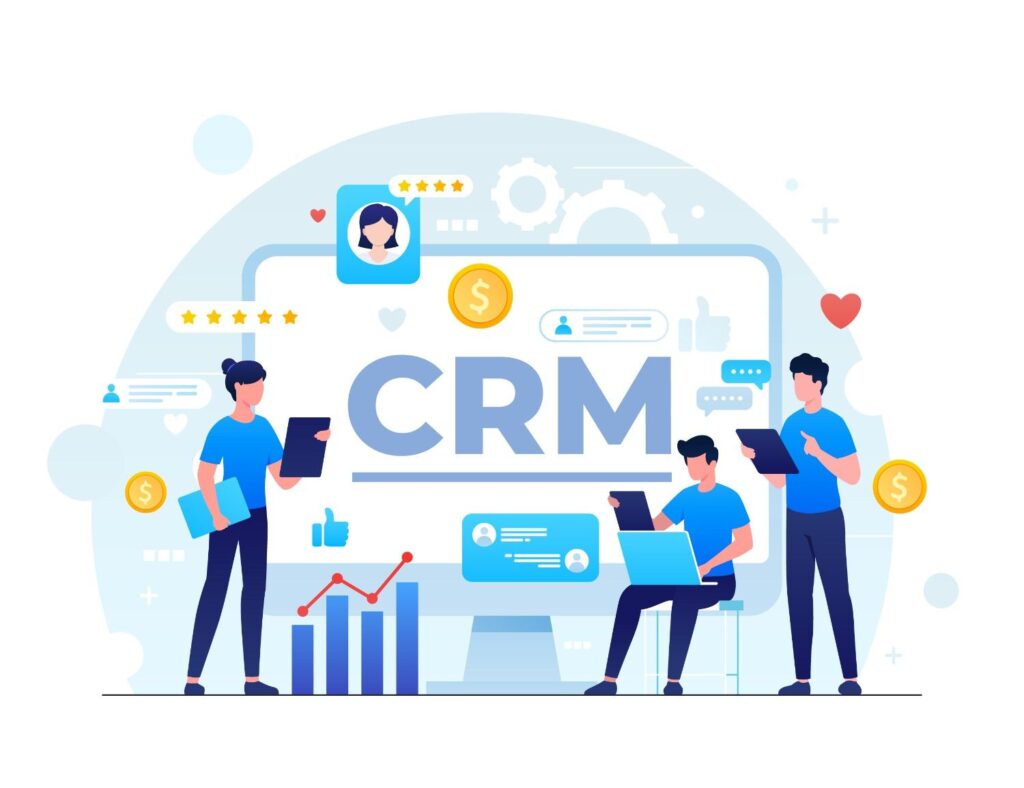Best CRM Software for Travel Agencies in 2025: Features, Pricing & Reviews

Running a travel agency in 2025 is not easy. You deal with dozens of bookings, endless emails, flights, and customer queries every single day. However, it is not a problem that has no solution. You need the right direction and a few tools for your business.
To run a smooth Travel BPO Services business, your primary aim must be to provide a matchless experience to your guests. However, without the right tools for the right tasks in 2025, you will feel stuck in spreadsheets and haphazard notes, rather than providing value to your customers.
I have been there. That is why using the right CRM software is no longer optional for travel companies; it is necessary. The best CRM for travel agency work will not just store your customer data. It will also help you track leads, manage bookings, and improve how your team works together.
If you are serious about scaling your travel agency and want to scale it up, you should have two basic goals:
1. Keep customers happy
2. Stay ahead of competitors
In 2025, this is quite doable with the help of the best CRM for travel agencies. This guide is all about this.
Below, I will show you the top CRM tools for travel agencies in 2025. I will explain their features, provide honest user feedback, discuss prices, and guide you on how to choose the one that fits your business. I will also share some tips based on real agency problems and how a CRM system can fix them.
Why CRM Software is a Must-Have for Travel Agencies
Running a travel agency without a proper system is like flying without a map. You might still reach your destination, but the journey will be delayed. I have seen many travel companies lose leads just because they forgot to follow up.
Some double-book clients. Others spend hours searching for basic customer details. These minor problems stack up and slow the whole business down. A travel agency CRM, especially when paired with a form tracking solution, prevents these issues by capturing every inquiry in real time and making sure no lead slips away.
A travel agency CRM fixes that. It keeps everything in one place, such as:
- Client info
- Booking records
- Messages
- Payment status
- Package preferences
You no longer have to search through emails or notebooks. A sound CRM system for travel agency work allows you to see every customer’s history. It also allows you to send reminders and assign tasks to your team. All in just a few clicks.
It also saves money by reducing mistakes and repeating work. You don’t need to hire someone just to track leads or confirm flights, which increases your ROI (return on investment).
And because everything is more organized, your customer service naturally improves. When a client feels remembered and well-treated, they return and bring others with them.
In short, a CRM is more than software. It is your silent helper that works around the clock. If you want to grow faster and keep your clients happy, this is the tool you need.
Key Features to Look for in the Best CRM for Travel Agency
Not every CRM tool works well for travel businesses. Travel agencies need features that match how they work, such as:
- Booking trips
- Managing leads
- Staying in touch with travelers
- Handling payments
The best CRM for the travel industry will cover all of this and more. Here are the must-have features to look for before choosing a CRM.
1. Lead and Booking Management
This is one of the most essential features in any CRM for travel companies. With this tool, you can track every new inquiry and save client details. Now you have important info, and can turn those leads into confirmed bookings. You can also view the status of each trip, such as pending, confirmed, or canceled, from a single dashboard.
2. Customer Communication Tools
Travellers often have questions. A good travel agency CRM should provide you with the tools to respond quickly. This is sometimes the most important feature. Some travellers wait and see details from different travel agencies, while others simply do not.
They look for instant bookings and want real-time messaging. Using reliable business communications software increases your chances of grabbing these customers quite easily if your system is efficient enough to answer their queries at any time of the day.
These tools usually have built-in chat, email, or WhatsApp features. They help you answer customer queries and stay connected throughout their journey without switching apps.
3. Sales Pipeline and Follow-ups
Not every book leads right away. That is where a sales pipeline helps. It shows you which stage each lead is in. You can break them in these terms:
- Just contacted
- Thinking
- Ready to book
It helps you send the right message at the right time. This boosts your chance of closing more deals as you have precise information about the steps different users are taking, and you can pitch accordingly.
4. Email and SMS Automation
You shouldn’t have to send the same message repeatedly. Luckily, many CRM tools also offer automation for emails and text messages. You can set reminders and confirmations for your customers automatically. It saves your valuable time and keeps your agency active in the traveller’s mind.
5. Custom Itinerary or Package Builder
Many travellers want personalised plans. A strong CRM for travel agents will allow you to create and send custom itineraries or holiday packages. You can save templates that worked for you previously and edit them quickly to personalize them for every customer. Now, you can share them with clients in minutes.
6. Task and Team Management
If your agency has a team, task control is key. Fortunately, a good CRM will help here too. A CRM system for travel agency work enables you to assign duties and set deadlines. Like task management apps, a CRM system for travel agency work enables you to assign duties and set deadlines. It keeps track of what each team member is doing. This avoids confusion and improves team coordination.
7. Reports and Performance Tracking
A robust CRM for the travel industry should give you clear reports. You can see:
- How many bookings do you have
- Where leads dropped
- Which team members are performing best
This helps you make smarter business decisions based on real data.
8. Mobile Access and Remote Use
In 2025, you need tools that work on the go. The best CRM software for the travel industry will let you access all your data on a phone or tablet. This means you can handle bookings or respond to clients even when you are travelling yourself.
9. Invoice and Payment Tracking
Money flow matters. A CRM that handles invoice management and payments, often working alongside invoicing software, helps you know who has paid and who still owes. It also checks what refunds are due. This keeps your accounts clear and avoids payment delays or mix-ups with clients.
10. Built-in Integration with Other Travel Tools
Your CRM should integrate with the tools you already use, such as GDS systems, email platforms, calendar apps, or payment gateways. With the right CRM for travel companies, everything syncs smoothly. So you do not have to enter the same data twice.
Related Blogs: 15 Best Travel Apps Every Smart Traveller Needs in 2025.
Top CRM Tools for Travel Agencies in 2025
Many travel agents ask me which CRM is the right one. The truth is, it depends on your team size, how you manage leads, and what kind of trips you sell. Some CRMs are better suited for solo travel agents, while others are designed for large tour companies. Below are eight tools that stand out in 2025. These are trusted, robust, and suitable for different needs in the travel industry.
1. HubSpot CRM
- Free Plan: $0 /month
- Paid Plans: Start at $15/month (Starter), $100/month (Professional), $150/month (Enterprise)
HubSpot CRM is a simple yet powerful tool that works well for small and mid-sized travel agencies. Its free version gives you contact management, cold email software, and deal tracking. If you need more features, you can upgrade anytime.
It helps you follow leads, track bookings, and manage communication, all in one place. Many consider it the best CRM for a travel agency, especially for those just starting and looking for something easy and cost-effective.
2. HelpSquad
Free Plan: Available
Paid Plans: Start at $500/month (part-time) and $1,560/month (full-time)
HelpSquad makes Customer Service Outsourcing simple, reliable, and cost-effective for growing businesses. Their paid plans give you access to trained agents who handle live chat, email, phone, social media support, and back-office tasks—without the hassle of recruiting or managing staff. With flexible pricing and no long-term contracts, HelpSquad’s customer service outsourcing is ideal for teams who want dependable coverage and improved customer satisfaction. Backed by 15+ years of experience, they integrate smoothly into your workflows, ensuring consistent service and seamless brand representation. For companies seeking scalable and efficient customer service outsourcing, HelpSquad delivers exceptional value.
3. Zoho CRM
- Paid Plans: Start at $14/user/month (Standard), $23 (Professional), $40 (Enterprise), $52 (Ultimate)
- Free Trial: Available
Zoho CRM is a cloud-based tool that helps travel agents manage leads, track bookings, and build strong customer connections. It offers useful features like email tools, workflow setup, reports, and pipeline tracking.
You can handle everything from one dashboard without switching between apps. Zoho also gives flexible pricing with no long-term contracts. For many in the travel industry, it is a good fit because it balances features and cost, making it one of the best CRM software options for growing travel businesses.
4. Pipedrive
- Plans: Start at $14/user/month (Lite), $24 (Growth), $49 (Premium), $69 (Ultimate)
- Free Trial: 14 days, no credit card needed
Pipedrive is excellent for travel agents who want a simple way to handle leads, track follow-ups, and see progress in one clean view. Its visual sales pipeline makes it easy to move each client step by step, from first contact to final booking. If you’re looking for a good deal, searching for a Pipedrive discount might be worthwhile as you explore the platform’s features.
The tool also enables you to send emails, automate tasks, and measure performance. Many agencies consider it the best CRM for travel agency teams seeking to reduce clutter and increase action without the need for complex tools.
5. Freshsales by Freshworks
- Plans: $9/user/month (Growth), $39 (Pro), $59 (Enterprise), build yearly
- Free Trial: Available
Freshsales is an innovative and easy-to-use CRM designed for travel agencies to manage leads, calls, and emails in one place. It has a clean layout, useful pipelines, and built-in chat and phone tools.
You can track every client’s journey and automate everyday tasks to save time. For growing agencies in the travel industry, this CRM offers strong reporting, helpful AI tools, and a simple way to handle everything from first contact to final booking.
6. Salesforce CRM
- Plans: Start at $25/user/month (Starter), $100/user/month (Pro Suite)
- Free Trial: Available
Salesforce is one of the most advanced CRM tools out there. It works best for large travel companies that manage numerous bookings and require complete control over their sales, marketing, and customer service.
The Starter plan includes tools for email, lead tracking, and online selling. With the Pro Suite, you get more automation, real-time chat, quoting, and access to third-party apps. For travel agencies aiming to scale fast, Salesforce offers a complete set of tools in one system.
7. Microsoft Dynamics 365 CRM
- Prices: Sales Professional $65/user/month, Sales Enterprise $95/user/month, Sales Premium $150/user/month
- Team Member license: $8/user/month for limited access
Microsoft Dynamics 365 CRM is the best solution for larger travel agencies with complex customer needs. It includes tools for lead tracking, service management, advanced analytics, and AI-based sales guidance.
The pricing structure lets you pick the right level for your team size, and you can add extra modules if needed. It works well when you need deep customization and reporting in a single CRM system for travel agency operations.
Teams that only need basic access, for example, viewing customer lists or approving tasks. They can use the cheaper team‑member license for $8 per user. That makes it easier to stay within budget while giving full CRM access to core staff.
8. Copper CRM
- Plans: Start at $12/user/month (Starter), $29 (Basic), $69 (Professional), $134 (Business), billed yearly
- Free Trial: Available
Copper CRM, previously known as Prosper Works, is built mainly for Google Workspace users. It connects with Gmail, Calendar, and Docs to log emails, tasks, and meetings automatically. This saves time and cuts down on manual updates.
It is a wise choice for solo agents or small travel teams who want to reduce admin work. If your agency already works inside Google tools, Copper offers a smooth and organized way to manage leads. It makes it a solid CRM for travel companies.
9. Insightly CRM
- Plans: $29/user/month (Plus), $49 (Professional), $99 (Enterprise), billed annually
- Free Trial: 14 days, no card needed
Insightly is a wise choice for travel agencies that also manage group tours, retreats, or event-based trips. It combines CRM and project management tools in one place. You can track leads, follow tasks, and organize team activities with ease.
As your agency grows, features like automation, custom workflows, and advanced dashboards help you stay on top of things. For travel agents needing both customer tracking and project handling, In Sight is a flexible CRM for travel industry needs.
Related: Not only CRM tools, but AI-powered chatbots are also making a difference in answering queries on the spot. Check, 5 Reasons AI-Powered Chatbots Are the Future of Digital Marketing.
How to Choose the Right CRM for Your Travel Agency

Choosing a CRM can feel confusing at first. I have helped many travel agents pick one, and the truth is that it all depends on what your agency really needs.
Start by looking at how big your team is. A solo agent might need something simple, while a company with multiple staff will need features like team tracking and task sharing.
Next, think about your budget. Some tools are free to begin with. Others charge more but offer stronger automation or better support.
Ask yourself:
- Do I need to track leads and bookings?
- Will my team use this daily?
- Do I want it to connect with Gmail, WhatsApp, or other tools I already use?
- Is reporting and performance tracking essential for me?
Also, take a free trial before deciding. Use it with real clients for a week or two. See if it fits your daily work or feels like extra work.
My tip: Don’t choose a CRM simply because it is popular. Choose one that actually makes your daily work easier. And for that, using a free trial for a few days helps a lot.
The right CRM for travel companies is the one that feels like a helping hand and not another task for you to deal with.
How to Set Up Your CRM System Smoothly
Once you’ve chosen the best CRM for travel agency work, the next step is to set it up properly. This part is just as important as selecting the software.
Start small. First, add your company details and basic settings. Next, slowly bring in your customer data, such as past bookings, contact information, and follow-up notes.
Here is how to set it up in simple steps:
- Import your data carefully: Use Excel sheets or migration tools. Check everything is correct.
- Organize leads and contacts by status: new, in progress, booked, or cold.
- Set up pipelines: Create clear stages like inquiry, quote sent, confirmed, and completed.
- Train your team: Ensure everyone is familiar with the main features. A short session works best.
- Automate small tasks: Add email follow-ups, payment reminders, or birthday messages.
Take your time during setup. Do not rush it. A clean start will save you hours later. I always suggest testing the system with a few bookings before making the switch entirely. Once it is all set, your CRM will feel like a part of your team.
Related Blog: Top Travel Booking Software for 2025: Features, Pricing & Best Picks
Your Travel Business Deserves the Right Tools: Now You Know Where to Start
Finding the best CRM for travel agency work is not just about picking the biggest name. It is about selecting a tool that aligns with your workflow and enhances client service. In this guide, we explored what features matter, which tools stand out in 2025, and how to choose and set up the one that fits your travel business.
The right CRM software can become your daily helper in handling leads, bookings, and team tasks quietly in the background.
Want more helpful tips like this?
Follow TripFrogApp.com to explore more blogs on travel software, destination guides, and tools that make your travel business smarter.
Frequently Asked Questions
1. What is the best CRM for travel agency businesses in 2025?
The best CRM for travel agency work depends on your needs. HubSpot and Zoho are great for small teams, while Salesforce or Microsoft Dynamics 365 fit larger travel businesses with more complex needs.
2. Is CRM software for the travel industry only for big companies?
No. Many CRM tools offer simple plans that even solo travel agents or small teams can use. You can start with basic features and upgrade later when your agency grows.
3. Can a CRM for travel agents handle bookings and payments?
Yes, most CRMs help track bookings, customer info, and even payment history. Some tools also integrate with payment systems or booking engines to simplify the process.
4. What features should I look for in a CRM for travel companies?
Look for tools that offer lead tracking, communication, automation, and reports. A good CRM for travel companies keeps everything organized and saves you time.
5. How hard is it to set up a CRM system for travel agency use?
Most tools are easy to set up. You can start with a free trial, import your client data, set up stages, and begin using it in just a few hours.


